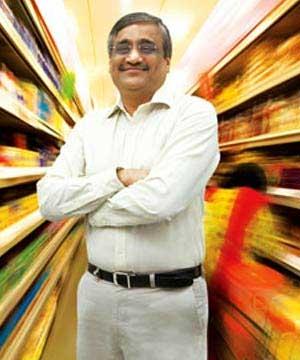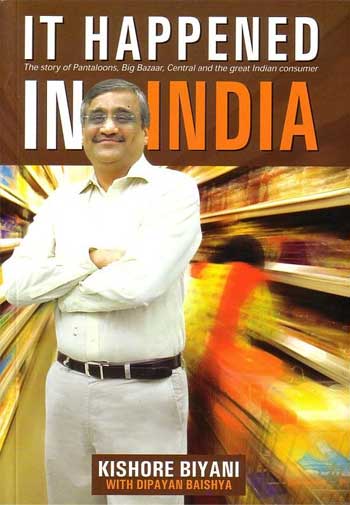
Twenty years ago, he was just another nondescript trouser manufacturer. A little more than 10 years ago, he was just about getting started, setting up a few stores to sell his products. Since then, Kishore Biyani, founder and CEO of the Future Group, has emerged as the largest and perhaps the most successful retailer in India.
Today, his empire sprawls across 12 million square feet of retail realty in 65 cities and 71 locations, employs 30,000 people and clocks an annual turnover of Rs 11,000 crore. Biyani has also branched into several other consumption-led businesses and new ventures like insurance and logistics. In a freewheeling talk with A Anand, he looks back at successes, failures and other defining moments in his entrepreneurial life.
Early on in your entrepreneurial career, many did not take you seriously. Could you recount some of the early troubles you faced as a fledgling entrepreneur?
Without pain, there is no gain. That is even how Indian temples are built. You have to walk miles before you can meet God. Everybody has to go through pain. The issue is -- are you looking at it as a pain or do you look at it as a learning experience? I always look at these as learning experiences along the journey.
Could you talk about a couple of specific challenges you faced early on?
Basically, it was about belief. Initially nobody wanted to join us. Most people looked at us in disbelief. Those who joined wondered whether we would make it. Few believed in our story at that point in time. Property was another big challenge early on.
Was there a defining moment when you started believing in yourself?
I think when I saw the crowds in the stores, that was the defining moment. When we opened Pantaloons and whenever we did a discount sale, we saw queues of customers outside the store. That gives you a lot of confidence.
How did Sam Walton influence your business?
A number of people have influenced me. You learn from every incident and every experience you go through in life. You can learn something from every individual. I have learnt from many books, particularly from Walton's book, Made in America. We hardly knew large-format retailing and how to do it, so that book was a source of learning. When I read the book the first time, I had marked ideas on every page, many of which we implemented in our business. There was a lot to learn about Walton's aspirations and his journey. Unlimited Power by Anthony Robbins was another book I learnt a lot from.
You have always relied upon your native wisdom without aping international models. Why?
The corporate world is still very young in this country. So, you will not have case studies or reference points. Sometimes, whatever you do is actually being done for the first time. I might have used the art of retailing more than the science of retailing earlier on. Now, the science of it is increasing as our scale is getting bigger and bigger. In the beginning it was pure art in all its form and glory. But, even then, we would always measure cause and effect. To that extent the science was always there in our business -- also, in the sense that you always have to track the numbers. The challenge for us at the moment is how we combine the art with the science of retailing.
How has this worked for you?
We are very different in our decision-making. Data alone does not help you take the best of decisions. Data along with the softer skills can work well. The consumer does not look at data when he spends. He goes by emotions. Emotions sometimes prevail over logic and rationale.

Is it 80 per cent science and 20 per cent art now?
I don't know. I don't like to see things only in black and white. But I believe that the right brain and the left brain have to work together.
You have often backed your hunches. How did you get the courage and do you still do it now?
We always prototype any idea before we roll it out. Prototyping helps you experiment and it gives you the confidence to go to the next level of scale. It also reduces risk. And yes, we still do (back hunches). But our scale is much larger now, so we try to validate hunches at every step. That is why we brought in McKinsey to look at data, numbers, etc. You can't work on gut and instinct alone. We were lucky to do that earlier on. Today it is not easy.
The Future Group does not have a rigid business model -- everything is fluid and everything can change. Was that a conscious strategy?
Yes. That was part of the original design. Nothing is permanent. The world will change very rapidly and no one can predict the changes. So we decided we should be ready to work in such an environment. I still believe in ambiguity, I still believe in openness.
How do you deal with failure in the organisation?
We laugh it off. Admit that we were fools and that we made a mistake. We do that often enough. We encourage them to look at both sides of situation. Everyone is allowed to fail once -- only once. We do allow people to make one mistake.
And your personal failures?
Yes. That's how I deal with failures of any kind. Without failures, there is no success. We have faced product failures, format failures and location failures.
But which failure rankled you the most?
Film-making was one. We thought we knew the consumer and that we will be able to create a product that consumers like. But on the first day, first show itself (of Na Tum Jaano Na Hum) the consumer tells you that you are stupid.
And your failures in retailing?
Sometimes, when we looked back at a lot of formats and a lot of categories, we thought we should have avoided doing such-and-such thing or we should have partnered with someone rather than going it alone.

How would you define yourself as a leader?
I take views from many people. I'm a very soft leader. I can't be brutal in making decisions. That's one thing I lack. That does not mean that I do not take tough decisions. I do. It's just that I am not made that way. We take decisions very fast. If something is not working, we shut it down. If a joint venture is not working, we end it. But on the human and emotional side, we are very soft.
What do you think about employment opportunities in retailing, in the present scenario?
We will continue to hire. There might be a lull right now, but things should be okay in a couple of months.
What kind of people do you recruit? What characteristics and personal traits do you look for?
I look out for Indian-ness. Anybody who does not understand India or Indian thinking, we don't hire.
And how do you judge that?
I need just a meeting to identify that. Anyone without that understanding won't last more than a month with us.
In your book It Happened in India, you talked about the need to destroy and create. Is that really necessary?
Look at the world since September 2008. Everything has changed. All my presentations, numbers and projections seem pre-historic now! We have totally destroyed our pre-September thinking. For example, growth for me now means getting more out of the same.
What would you advise entrepreneurs at a time like this?
This is the time to build businesses. The current environment presents opportunities for new things to be done and new businesses to be formed. We're prejudiced by the past. Fresh thinking is the need now.